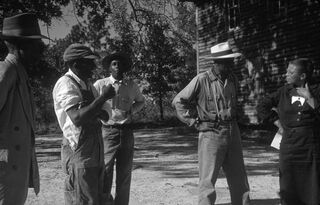Religion
Tribalism: How to Be Part of the Solution, Not the Problem
Whether it's race, religion, or politics, tribalism threatens all we hold dear.
Posted July 31, 2022 Reviewed by Abigail Fagan
Key points
- Tribal group memberships have many benefits, including safety, survival enhancement, and vicarious rewards.
- Despite the benefits of tribalism, the dangers — including cognitive distortions and appeals to violence — may be more significant.
- Consequentialism, which applies an "ends-justifies-the-means" ethic, is often used by those with a tribalist mindset to rationalize violence.
- Research suggests that our perception of other people's behavior as violent may be related to whether we believe they're part of our tribe.
"To find peace, learn to lose." —The Tao Te Ching
Humans, like wolves, are pack animals. Sure, we may fetishize individualism during times of abundance, but as the iconic Game of Thrones character Ned Stark eloquently put it: "When the snows fall and the white winds blow, the lone wolf dies, but the pack survives.” Beyond physical survival, our various tribal memberships bestow other important benefits, like being able to buy ridiculous quantities of Lucky Charms at discount prices, for those of us who are members of the Costco tribe.
Our lives begin within our most intimate tribe, our family, whose job it is to protect and nurture us until adulthood. But then gradually, over time, we get introduced to members of other related tribes — our racial and ethnic groups — with whom we share many of our most basic traits, including our phenotypes, genetics, and cultural histories. And then there are the tribes we choose, based on religion, politics, the places we live, the schools we attend, the teams we root for, and even the cars we drive. (In my experience, owners of Jeeps and Priuses have some of the strongest car-based tribal identifications.)

Take a moment and reflect on your strongest tribal affiliations. Do they involve demographic characteristics, like your race, ethnic group, or sex? Or are they related to identifications that you've chosen, like your political party or religious group?
Our tribal memberships, besides offering us safety, power, and the ability to purchase obscene quantities of a certain "magically delicious" breakfast cereal, also provide us with pride and vicarious feelings of success when our tribe triumphs as a whole, or its individual members succeed. These are basic tenets of social psychology (Clark et al., 2019). The problem, however, is that tribalism also leads to some very bad behaviors and cognitive distortions.
Though some might believe that most wars are fought over religion, a more contemporary understanding (Hobfoll, 2019) is that "wars are always tribal," and an individual's religion is but one of many affiliations that lead people to indulge in tribalistic violence: the current war in Ukraine, initiated over Russian historical grievances and perceived NATO threats (not anything related to religion), is a daily reminder of this.
Similarly, those who are fans of The Godfather, or are students of Italian mafia history, know that even when rivals are of the same race, ethnicity, and religion, as were the notorious five families of the Italian-American mafia, tribalistic violence is still a common outcome. This particular version of tribalistic violence played out on the streets of New York for much of the 20th century and was perpetrated in defense of honor, turf, and business interests.
Mafia violence, though primitive, is at least related to the defense of family and resources, and on that level it makes evolutionary sense; but when it comes to violence related to other chosen identifications, like the sports teams we root for, the excuse for brutality is much more tenuous. In a viral video captured during this year's NHL playoffs, a member of my own tribe, New York Rangers fans, viciously sucker-punched a Tampa Bay Lightning fan in the face for no other reason than the Lightning had just beaten our tribe's team. It was a despicable act that embarrassed me and many other members of my tribe, but it was just one of countless acts of violence committed every year by rival sports fans across the world.
Today, however, political tribalism is perhaps its most powerful and dangerous variant, even pushing members of the same family to elevate their political tribe over their familial tribe. Our political beliefs reflect our values, and our values reflect how we believe the world should work — to increase the prospects of our physical and psychological survival — and on this level, ardent political tribalism is understandable.
But tribalism of all kinds lends itself to cognitive distortions, which are exploited by intellectually dishonest propagandists across myriad platforms of traditional and social media. As noted above, violence is an all-too-common consequence of tribalistic propaganda, as is the rationalization of that violence afterward, which normalizes it and makes it more common. Voltaire, the 18th-century French philosopher, famously said "Those who can make you believe absurdities can make you commit atrocities." To this, I would add that there's no limit to the atrocities everyday people can justify when they believe their cause is just or that they are the disadvantaged underdogs in a conflict.
The tribalist mind is given to objectifying people as part of its larger ends-justifies-the-means rationalizations, which it uses to ensure the tribe's success. An ends-justifies-the-means approach to problems — which is usually simple and efficient — always sounds good when you free yourself from considering the collateral damage and long-term consequences of your actions. Enabling this willful blindness is the use of myriad defense mechanisms — especially denial and repression — which tribe members use to mutually support and validate each other.

An ends-justifies-the-means approach, which is known in philosophy as consequentialism, has been used throughout history to rationalize countless atrocities. On a large scale examples include, slavery; the extermination of Jews in the Holocaust; and the annihilation of thousands of Japanese with atomic bombs in Hiroshima and Nagasaki in WWII. On a smaller scale, the Tuskegee Syphilis Study stands out as one of many examples from the past century.
Media organizations feed our tribalist urges and exploit them for profit, deepening our national divisions. Across the political spectrum, media outlets minimize the bad behavior of their respective tribes while using straw man commentary to make those in opposing tribes appear as dangerous boogeymen. Politicized media organizations know, what philosopher Eric Hoffer (1951) wrote inThe True Believer, that “hatred is the most accessible and comprehensive of all unifying agents,” and that “mass movements can rise and spread without belief in a god, but never without belief in a devil.”
But we don't need any help from the media to stoke tribalist reactions within us, human nature already primes us for it. Research into our cognitive biases suggests that our political beliefs bias what we see, and this appears especially true for those with a tribalist mindset. As demonstrated in a widely-publicized study by Kahan and colleagues, (2012), participants in two groups watching the same protest video differed on whether they judged the protesters' actions as civil or aggressive based solely on whether they were told that the protest aligned with their political ideology or an opposing ideology — i.e., whether the protesters were members of their tribe or a rival tribe. This study has been cited often by political commentators in the aftermath of the January 6th US Capitol riot, as well as the lesser-known Wisconsin Capitol riot of 2011 (State Journal Staff, 2011).
With these innate cognitive biases seemingly hard wired into our human nature, how can we ever overcome our tribalist instincts to find common cause for the common good? As a psychologist, I believe the solution is by helping each individual become more aware of his or her own cognitive biases and tribalist excesses, and how those biases perpetuate cycles of conflict.
To keep our tribalist impulses in check, I believe we must regularly ask ourselves difficult questions:
- Do I know how to recognize the propaganda of my own tribe, and resist it when I see it?
- Do I recognize that every event can be viewed from multiple perspectives and that my tribe's perspective is just one of many?
- Do I pursue multiple perspectives on important issues with intellectual honesty — or do I only solicit my own tribe's political perspective?
- Do I call out members of my own tribe for bad behavior as often as I call out members of rival tribes — or do I rationalize and ignore their transgressions?
- Do I have compassion for everyone on the road of truth, even those who are walking today where I walked yesterday?
In the end, while it may be impossible to divorce ourselves from all of our tribal memberships, if we regularly check ourselves for tribalistic excesses, we will be doing the best we can to foster a more peaceful world. Don't worry, however, for if you're unable to rein in your tribalist indulgences, I'm sure your friends from rival tribes will do it for you: though I doubt they will be as gentle.
References
Clark, C.J., Liu, B.S., Winegard, B.M., Ditto, P.H. (2019). Tribalism Is Human Nature. Current Directions in Psychology, 28, 6.
https://doi.org/10.1177/0963721419862289
https://journals.sagepub.com/doi/abs/10.1177/0963721419862289
Hobfoll, S. (2019). Threat and the rise of fear politics and tribalism, in P. Buchwald, K. Moore, K. Kaniasty, & P. Arenas-Landgrave's Stress and Anxiety, Logos Verlag Berlin.
Kahan, D.M., Hoffman, D.A., Braman, D., Peterman, D.I., Rachlinski, J.J. (2012). ‘They Saw a Protest’: Cognitive Illiberalism and the Speech-Conduct Distinction: Cultural Cognition Project Working Paper No. 63, Stanford Law Review, Vol. 64.
State Journal Staff. 2011. Thousands storm Capitol as GOP takes action. Madison.com, March 10, 2011.
Hoffer, E. (1951). The True Believer: Thoughts on the Nature of Mass Movements, Harper and Row, New York.




